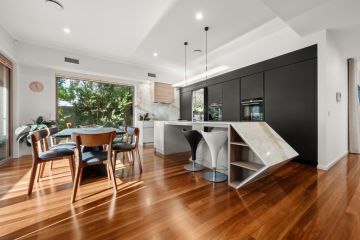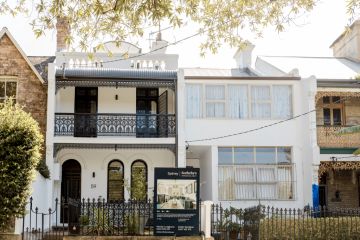Stamp duty scrapped for first homes, government moves to grant cut
The territory government’s total tax pool will rise 10 per cent next fiscal year, the biggest increase in three years, as Chief Minister Andrew Barr looks to produce a $36 million surplus.
The government will also scrap the first home buyer grant and abolish stamp duty for new homebuyers from July next year, speeding up the broader 20-year tax reform for those buyers.
Rates for detached homeowners will rise 7 per cent on average for the coming year, or about $172, to an average of $2474, while unit owners face a 10 per cent, or $135 rise on average, to $1472.
Unit owners will also lose the one-off $100 rebate after last year’s change in rates calculation, but the increases to marginal rates have been tempered this year to soften the rise.
Overall, the territory government’s own-source revenue will increase 10 per cent, the biggest rise in three years, after a 6 per cent rise in 2017-18 and 4 per cent rise the previous year.
But Mr Barr rejected the proposition the 20 per cent rise in total own-source tax revenue broke with the government’s compact with voters that the 20-year tax reform agenda would not increase overall taxes.
He said such growth in taxes was in line with population growth and economic growth, saying there were thousands more people and businesses now operating in the ACT that were not seven years ago when the reforms began.
Mr Barr also admitted there was an extra amount of tax revenue beyond that which could be attributed directly to population and economic growth, though he did not cite a specific figure on Tuesday.
The budget has also confirmed the government’s direction on “city renewal”, with $1.1 million over two years set aside to commission a full business case for the Canberra Theatre redevelopment, rather than putting money towards a new convention centre, stadium or pool in the city.
Mr Barr said that should be a clear indicator, and he saw the potential for a city stadium as a project for 10 to 20 years from now, along with the all-but-shelved new convention centre and the proposal for a new city public pool.
He also confirmed the government was still in talks to buy Canberra Stadium and the Australian Institute of Sports’ land, which could be used to build a new stadium on the site, or redeveloped to help fund a new stadium in the city.
Mr Barr also said the government was negotiating with the National Capital Authority over a potential purchase of resumed land, currently part of Lake Burley-Griffin, for the controversial City to the Lake redevelopment, though a final deal was some way off.
For the main tax change in the budget, about 1800 first home buyers are expected to be affected, if the past three year average is any guide. But only 200 of those actually received a small discount on stamp duty, leaving 1000 worse off to a varying extent, while the rest bought established homes and paid full stamp duty.
Total rates revenue will rise 11 per cent for both residential and commercial ratepayers, payroll tax will rise 6 per cent and land tax will increase 8 per cent.
Mr Barr said his seventh budget would deliver a $36.5 million surplus, and “remain in surplus” for the next three years, with forecasts for a surplus of $43.9 million in 2019-20, $25.9 million in 2020-21 and $52.9 million in 2021-22.
The government has previously defined budget success as a “balanced budget”, or within $30 million in deficit or $30 million in surplus, and Mr Barr emphasised the budget was now in “balance”, and regarding such figures as little more than a “football scorecard”.
But that is, in part, built on delaying $344 million worth of capital works originally scheduled to be spent in 2017-18, about $300 million of which has been allocated beyond 2018-19.
The government’s net debt will also hit $2.1 billion in 2018-19, $100 million higher than forecast in last year’s budget, and it will continue rising to about $2.8 billion in 2020-21 and 2020-22.
The government will abolish both the $7000 first home owners grant and stamp duty for those buyers from July 2019, and abolish the 1 per cent early rates payment discount – which had been repeatedly cut in each of the past three years.
The government will remove the controversial fixed location speeding cameras, in favour of buying two or three more mobile speeding cameras, which it believes will net about $15 million in extra revenue over four years.
Despite continuing the plan to eventually abolish stamp duty, this year revenue from it will rise 34 per cent for commercial transactions and 17 per cent rise for residential sales, to $190 million and $348 million each, respectively.
Overall, the budget forecasts $5.7 billion of revenue in 2018-19, up $82.9 million since the February budget review, on the back of $21 million in “technical adjustments”, $24 million related to extra land sales income and $15 million more in GST revenue.
On the expense side of the equation was $5.8 billion in spending, up $53 million since February, with an extra $100 million in new initiatives largely on local government-related city services, offset by a $72 million fall in large-scale renewable energy generation certificates.
The main new expenses in 2018-19 included $5 million for new hospital in the home services, about $9 million for teachers and students, $4 million for the Alexander Maconochie Centre and $2.5 for the child sexual abuse redress scheme.
Despite Housing Minister Yvette Berry’s promises of a significant housing package to be delivered in this year’s budget, the biggest new initiative in that portfolio was $6.5 million for more frontline specialist homelessness services.
There was also $750,000 allocated to new innovative “housing choices” and a single item for “innovation to boost affordable housing”, though the government refused to detail what, or how much, that measure was worth.
We recommend
We thought you might like
States
Capital Cities
Capital Cities - Rentals
Popular Areas
Allhomes
More







